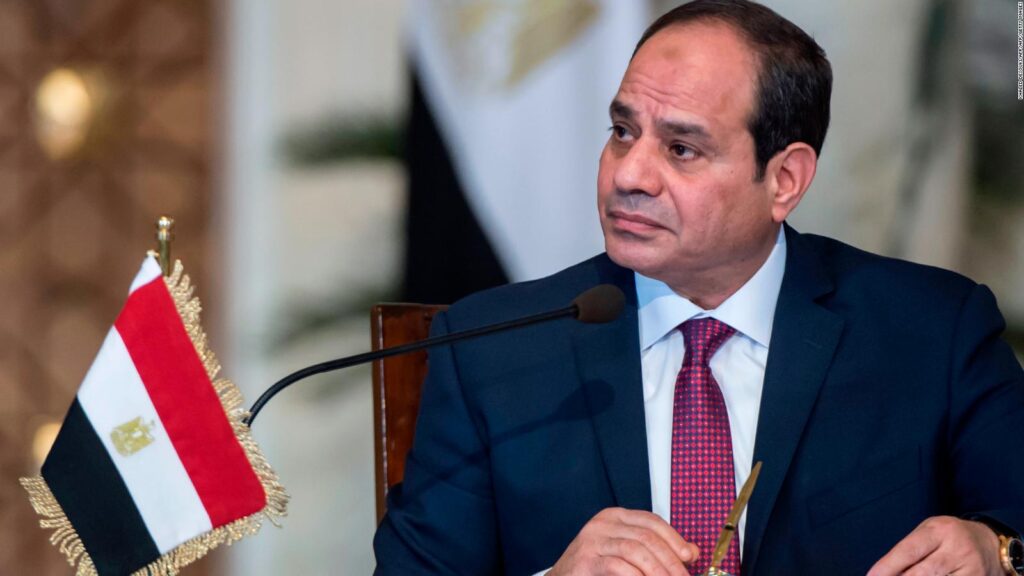Early Life and Military Background
Abdel Fattah el-Sisi was born on November 19, 1954, in Cairo, Egypt. Growing up in a modest family, he was exposed to the dynamic socio-political atmosphere of post-revolutionary Egypt. His early years coincided with the rule of Hosni Mubarak, who led Egypt with an iron fist for nearly three decades. Sisi’s upbringing was shaped by Egypt’s complex political landscape, marked by state control, military dominance, and a mix of political unrest and periods of stability.

Sisi’s path to power began in the military, an institution that has historically held significant influence in Egypt’s political structure. He enrolled in the Egyptian Military Academy in 1977 and swiftly rose through the ranks, cementing his position as a dedicated and skilled officer. Throughout his military career, Sisi gained prominence due to his loyalty to the Egyptian state and his competence in both strategic and operational military affairs. He participated in numerous military missions and was involved in counterterrorism operations, gaining the respect of his peers and superiors. His rise was rapid, and by 2012, he was appointed Director of Military Intelligence.
The Egyptian Revolution of 2011 and Its Aftermath
The 2011 Egyptian revolution, which saw the ousting of longtime president Hosni Mubarak, was a watershed moment in the country’s modern history. The revolution brought millions of Egyptians to the streets in protest of government corruption, economic disparity, and the authoritarian rule of Mubarak. Despite the political turbulence, the Egyptian military, which had been the backbone of the Mubarak regime, maintained its central role in the country’s political system.
After Mubarak’s fall, Egypt entered a period of political instability, marked by the rise and fall of different governments. Mohamed Morsi, a member of the Muslim Brotherhood, emerged as the first democratically elected president in 2012. However, his presidency faced significant challenges, including growing opposition from secular and liberal groups, economic difficulties, and an inability to bridge the country’s political divides.
By 2013, dissatisfaction with Morsi’s rule reached a boiling point. Protests erupted across the country, accusing Morsi of consolidating power and failing to address Egypt’s socio-economic issues. In response, el-Sisi, who had become head of the Egyptian military in 2012, led a military coup against Morsi on July 3, 2013, with the backing of widespread public protests. This dramatic turn of events saw Morsi arrested, and the military assumed control of the government, leading to the suspension of Egypt’s constitution and the dissolution of the Islamist-backed government.
Seizing Power: A New Era of Authoritarianism
Following the coup, Sisi’s political ambitions began to crystallize. The military-installed government, led by interim president Adly Mansour, presented itself as a stabilizing force following the chaos of Morsi’s rule. Yet it quickly became evident that the military was consolidating power in a way that would ultimately pave the way for Sisi’s rise. In 2014, after Mansour stepped down, Abdel Fattah el-Sisi of Egypt officially entered the presidential race and won with overwhelming support—albeit in an election that many critics dismissed as being neither free nor fair.
Sisi’s victory marked the beginning of a new era in Egypt’s political trajectory. With his extensive military background and the widespread backing of the armed forces, Sisi assumed power as Egypt’s president. His rhetoric promised a return to stability and national unity after years of upheaval. However, his rule would soon be characterized by a strict crackdown on political opposition, a rise in repression, and a heavy reliance on the military to maintain control.
One of the key promises of Sisi’s administration was the fight against terrorism, particularly in the Sinai Peninsula, which had become a hotbed of insurgent activity. Sisi’s government pursued a hardline approach against militant groups, deploying the military to combat extremists in the region. This approach resonated with many Egyptians who saw it as necessary to restore security. However, the military’s tactics often led to civilian casualties, raising human rights concerns both domestically and internationally.
Consolidating Power and Dismantling Opposition
As president, Sisi consolidated his power over Egyptian politics, effectively silencing opposition and limiting freedoms. His government targeted not only Islamist groups but also secular activists, journalists, and members of the political opposition. Thousands of political opponents were arrested, and media outlets critical of the government were shut down or heavily censored. The suppression of dissent, along with widespread human rights violations, prompted condemnation from international organizations and governments.
Sisi’s government also moved to extend its grip over Egypt’s political and economic institutions. The military, under Sisi, increased its role in the economy, taking control of a significant portion of the country’s industries, infrastructure projects, and businesses. This military dominance over economic life raised concerns about corruption and cronyism, with many accusing Sisi and his allies of enriching themselves at the expense of ordinary Egyptians.
Despite these criticisms, Sisi maintained significant popular support, particularly among the country’s middle and lower classes, who viewed him as a figure of stability and national pride. His leadership style, marked by a combination of populism and authoritarianism, resonated with many Egyptians who had become disillusioned with the chaotic transitions of the Arab Spring era. However, his administration’s focus on security came at the cost of broader democratic reforms, leaving the country with an increasingly centralized and autocratic political system.
Economic Challenges and International Relations
Egypt, under Sisi’s leadership, has faced numerous economic challenges. The country has struggled with high unemployment, inflation, and an unsustainable public debt burden. Sisi introduced economic reforms, including devaluing the Egyptian pound, removing subsidies, and implementing austerity measures as part of a loan agreement with the International Monetary Fund (IMF). These moves were controversial, as they disproportionately impacted the poor and marginalized communities. While some reforms were aimed at stabilizing the economy, the country’s vast economic problems have persisted.
Sisi has sought to balance Egypt’s relationships with global powers, particularly with the United States and regional players in the Middle East. The U.S. has been a key ally, providing Egypt with military aid in exchange for security cooperation in the region. At the same time, Sisi has deepened Egypt’s relations with Gulf countries such as Saudi Arabia and the UAE, both of which have provided financial support to his government. Sisi’s approach to foreign policy has been pragmatic, seeking to secure Egypt’s interests in a volatile region while navigating the complexities of international diplomacy.
Controversies and Legacy
Sisi’s presidency has been marked by deepening controversy, particularly regarding his repressive domestic policies. Human rights organizations have accused his regime of committing widespread abuses, including arbitrary arrests, torture, and the suppression of free speech. The regime’s response to dissent, including the brutal crackdown on the 2013 Rabaa massacre, where hundreds of protesters were killed, has remained a dark chapter in his rule.
Despite the growing discontent with his rule, Abdel Fattah el-Sisi of Egypt has managed to maintain his grip on power, thanks to his control of the military, the judiciary, and the media. In 2019, Egypt’s parliament approved constitutional amendments that allowed Sisi to remain in office until 2030, further entrenching his authoritarian grip on the country’s political system.
Sisi’s legacy remains contentious. To his supporters, he is the man who restored order to a nation ravaged by political instability and economic turmoil. To his critics, he is an authoritarian leader who has silenced opposition, curtailed freedoms, and undermined the democratic aspirations of the Egyptian people. As he approaches his second decade in office, the future of Egypt under Sisi’s rule remains uncertain, as the country continues to grapple with its political, economic, and social challenges.
